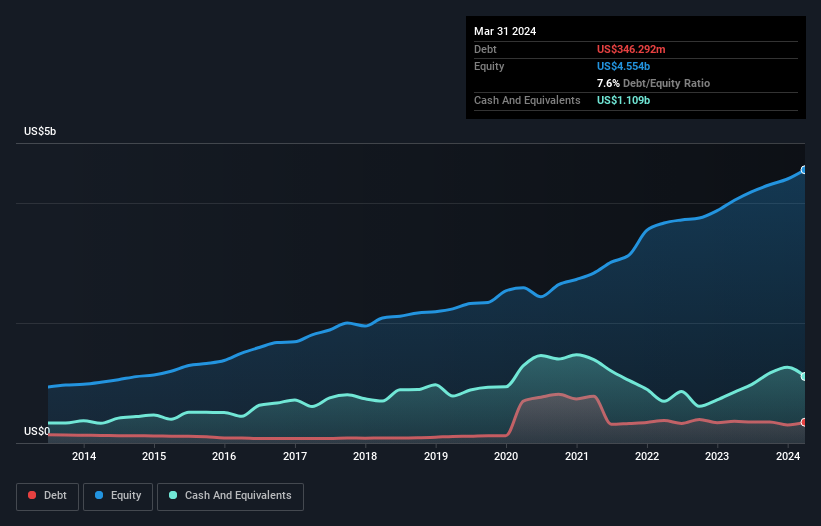
David Iben put it well when he said, 'Volatility is not a risk we care about. What we care about is avoiding the permanent loss of capital.' It's only natural to consider a company's balance sheet when you examine how risky it is, since debt is often involved when a business collapses. We can see that Skechers U.S.A., Inc. (NYSE:SKX) does use debt in its business. But should shareholders be worried about its use of debt?
When Is Debt Dangerous?
Debt assists a business until the business has trouble paying it off, either with new capital or with free cash flow. If things get really bad, the lenders can take control of the business. However, a more frequent (but still costly) occurrence is where a company must issue shares at bargain-basement prices, permanently diluting shareholders, just to shore up its balance sheet. Having said that, the most common situation is where a company manages its debt reasonably well - and to its own advantage. When we think about a company's use of debt, we first look at cash and debt together.
See our latest analysis for Skechers U.S.A
What Is Skechers U.S.A's Net Debt?
The image below, which you can click on for greater detail, shows that Skechers U.S.A had debt of US$346.3m at the end of March 2024, a reduction from US$361.2m over a year. But on the other hand it also has US$1.11b in cash, leading to a US$762.7m net cash position.

How Healthy Is Skechers U.S.A's Balance Sheet?
According to the last reported balance sheet, Skechers U.S.A had liabilities of US$1.64b due within 12 months, and liabilities of US$1.37b due beyond 12 months. Offsetting this, it had US$1.11b in cash and US$1.24b in receivables that were due within 12 months. So it has liabilities totalling US$669.7m more than its cash and near-term receivables, combined.
Given Skechers U.S.A has a humongous market capitalization of US$10.9b, it's hard to believe these liabilities pose much threat. But there are sufficient liabilities that we would certainly recommend shareholders continue to monitor the balance sheet, going forward. While it does have liabilities worth noting, Skechers U.S.A also has more cash than debt, so we're pretty confident it can manage its debt safely.
On top of that, Skechers U.S.A grew its EBIT by 45% over the last twelve months, and that growth will make it easier to handle its debt. The balance sheet is clearly the area to focus on when you are analysing debt. But ultimately the future profitability of the business will decide if Skechers U.S.A can strengthen its balance sheet over time. So if you want to see what the professionals think, you might find this free report on analyst profit forecasts to be interesting.
Finally, a company can only pay off debt with cold hard cash, not accounting profits. Skechers U.S.A may have net cash on the balance sheet, but it is still interesting to look at how well the business converts its earnings before interest and tax (EBIT) to free cash flow, because that will influence both its need for, and its capacity to manage debt. Looking at the most recent three years, Skechers U.S.A recorded free cash flow of 33% of its EBIT, which is weaker than we'd expect. That weak cash conversion makes it more difficult to handle indebtedness.
Summing Up
We could understand if investors are concerned about Skechers U.S.A's liabilities, but we can be reassured by the fact it has has net cash of US$762.7m. And it impressed us with its EBIT growth of 45% over the last year. So we don't think Skechers U.S.A's use of debt is risky. The balance sheet is clearly the area to focus on when you are analysing debt. But ultimately, every company can contain risks that exist outside of the balance sheet. For instance, we've identified 1 warning sign for Skechers U.S.A that you should be aware of.
If you're interested in investing in businesses that can grow profits without the burden of debt, then check out this free list of growing businesses that have net cash on the balance sheet.
New: Manage All Your Stock Portfolios in One Place
We've created the ultimate portfolio companion for stock investors, and it's free.
• Connect an unlimited number of Portfolios and see your total in one currency
• Be alerted to new Warning Signs or Risks via email or mobile
• Track the Fair Value of your stocks
Have feedback on this article? Concerned about the content? Get in touch with us directly. Alternatively, email editorial-team (at) simplywallst.com.
This article by Simply Wall St is general in nature. We provide commentary based on historical data and analyst forecasts only using an unbiased methodology and our articles are not intended to be financial advice. It does not constitute a recommendation to buy or sell any stock, and does not take account of your objectives, or your financial situation. We aim to bring you long-term focused analysis driven by fundamental data. Note that our analysis may not factor in the latest price-sensitive company announcements or qualitative material. Simply Wall St has no position in any stocks mentioned.
About NYSE:SKX
Skechers U.S.A
Designs, develops, markets, and distributes footwear for men, women, and children worldwide.
Very undervalued with adequate balance sheet.
Similar Companies
Market Insights
Community Narratives




